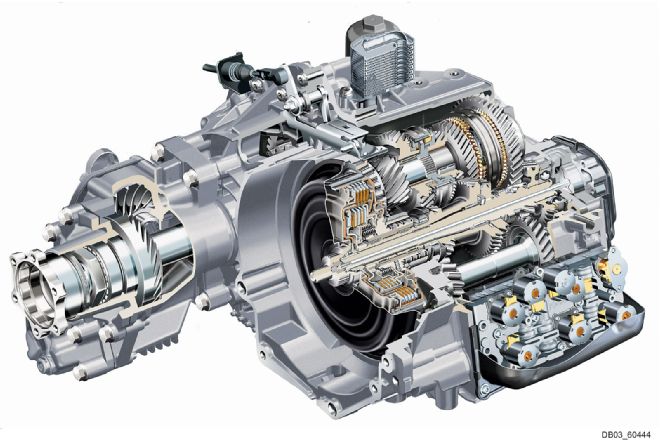2007 Volkswagen GTI
Performance Software
It's a well known fact that when VW released the Direct Shift Gearbox (DSG), it changed the world's perception of what an automatic transmission was capable of. Suddenly it wasn't a paradox using the words "sporty" and "automatic" in the same sentence. But while impressive, DSG is a major control freak that spends every millisecond contemplating ways to keep the engine's power and torque in check, but not in a good way. We were originally informed by the manufacturer that this extremely advanced piece of technology could only handle about 258 lb-ft of torque. So they installed a torque limiter in the transmission's computer that would cause the transmission to disconnect if the torque limit was exceeded. The power struggle goes on virtually unnoticed because chip tuners found ways around this, manipulating torque numbers that the ECU lets the transmission see. While effective in preventing disconnect, it still doesn't address the fundamental problem with the overprotective DSG computer. Symptoms could include excessive timing retard, loss of power, and listlessness. While these symptoms can be attributed to other factors, the most likely condition is an agitated DSG computer.
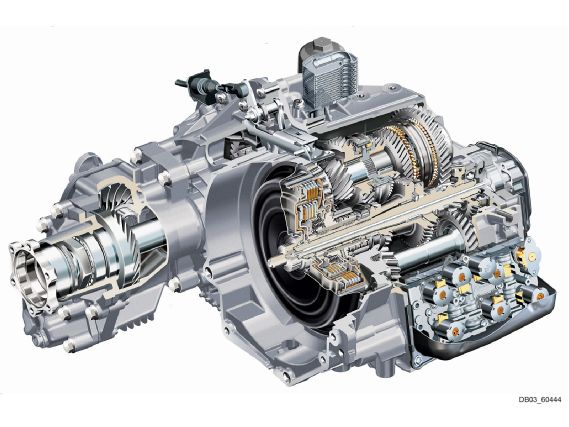 |
2007 Volkswagen GTI - Proven
|
2007 Volkswagen GTI - Proven
Vehicle Data
Engine: 2.0-liter I4, dohc, 16-valve, FSI direct injection, turbocharged and intercooled
Transmission: Six-speed Direct Shift Gearbox (DSG) automated manual
Drivetrain: FWD
Mileage: 32,728
Current modifications:
VF/GIAC RSS-20 big turbo kit, VF front mount intercooler, VF Milltek 70mm turbo-back exhaust with 200 cell metallic HJS catalytic converter
Dyno Data
DynoJet 224XLC
Ambient temp: 72°
Test gear: Third
Test octane: 91
Baseline
Peak power: 265 hp @ 6400 rpm
Peak torque: 247 lb-ft @ 4700 rpm
Temperature: 75° F
Humidy: 5%
Test Notes
All horsepower and torque numbers are SAE corrected and quoted at the wheels.
HPA DSG/S-Tronic
Performance programming stage 2
Test 1
Performance
Peak power: 268 hp @ 6700 rpm
Peak torque: 283 lb-ft @ 3900 rpm
Max power gain: 20 hp @ 5600 rpm
Max torque gain: 55 lb-ft @ 4000 rpm
Installation time: 30 minutes
MSRP: $899
Pros
• Increases the transmission torque limiter from factory limit of 258 lb-ft to 368 lb-ft
• Increases the transmission rev limiter to 7150 rpm; actual rev limiter is still controlled by the vehicle engine control unit
• Launch control activated on vehicles that did not come equipped with the feature from the factory
• Launch control maximum rpm raised to 4750 to better utilize torque curve
• Recalibrates upshifting and kickdown features in both M and S modes to optimize the driving experience
• Adds gear indicator in the instrument cluster next to the P-N-R-D-S icons
• Eliminates automatic shifting feature in S mode
• Progressive shift response uses a scaling effect to improve the shift response between gears to eliminate clutch slippage and reduce clutch wear on (D)rive, (S)port and (M)anual mode (tip-in throttle 1/3 faster than factory, 50% engine load or wide open throttle 2/3 faster)
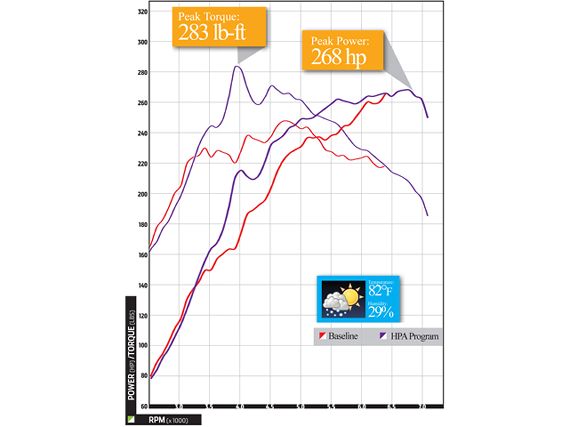 |
2007 Volkswagen GTI - Proven
|
2007 Volkswagen GTI - Proven
Cons
• Elimination of the automatic shifting feature in S mode
Test Notes
Because we didn't have the patience to wait for the schedule HPA had set up for its distribution network in the U.S.,HPA techs were gracious enough to fly down to Los Angeles from Canada to flash the DSG software. However, this prevented us from performing the after-test the same day, so we preformed test two days and about 100 miles later. The peak power and torque gains listed illustrate gains in the normal rpm range of 6400 rpm. The software gave us access to power that was limited by the transmission rev limiter, so technically we did record a peak gain of 268 hp at 6700 rpm.
Conclusion
When we first tested the VF/GIAC RSS-20 turbo kit on this 2007 GTI, it was immediately obvious that the DSG computer's internal rev limiter was preventing the Garrett GT28RS turbo from reaching its full potential. The original purpose of this Proven test was to demonstrate the power that could be gained by increasing the rev limiter in the transmission. We figured that the other features would be a subjective evaluation, but after a few dyno runs the HPA programming exposed something that was not readily apparent in DSG-equipped vehicle tests we have done in the past: the extent of the DSG's computer control on the rest of the rpm range.
It's my opinion that the torque limiter is responsible for the result. It's all about control. It seems like the transmission is constantly monitoring the engine torque trying to keep it below the torque threshold, and when it detects that it's getting close to that limit it starts retarding the engine's fuel and timing to reduce output. For those of you who own a modified DSG and find the 258 lb-ft number a bit confusing, the reason that your vehicle can produce higher torque numbers is because software tuners manipulate the torque data coming from the ECU to keep it right below the 258 lb-ft mark. This prevents the DSG computer from disengaging the transmission, but the problem is the computer starts to get involved when the torque numbers exceed 207 lb-ft.
The HPA software increases the torque limiter to 368 lb-ft, which effectively eliminates the DSG computer's meddling, allowing the engine computer to do its job with no ill effects. And overall, the HPA DSG/S-Tronic Performance Programming Stage 2 completely transformed the vehicle. Don't get me wrong, the vehicle was amazing before, but it was frustrating knowing peak power was just out of reach. The HPA programming solved that problem but did so much more than access hidden power. It also provided increased control.
Let's break down the key features. The Progressive shift points are designed to reduce the number of milliseconds it takes to change gears, (honestly though, how can one even feel a millisecond?) but the transmission seemed to transition between gears more quickly and smoothly than before the upgrade. The GTI already had launch control, and after using it twice we never used it again. Besides making lots of noise, there never seemed to be much use for it. The torque and rev limiter increase was the key to making more power. It would be interesting to see if, with less interference from the DSG computer, the engine software could be optimized for more power.
As for eliminating automatic shifting in S mode, I fell into a love-hate relationship. When you're focused, driving the canyons or on the track, it's perfect. The problem becomes apparent when driving around town. However optimized, D mode still lacks the power and snap found in S mode. But in certain situations while using S, the revs stay so high in range that engine noise stays at a constant pitch and becomes annoying. The ultimate upgrade would be eliminating D entirely and allowing two S modes: one with automatic shifting and one without.
The HPA programming for the DSG started in RGT projects for the 2005 SEMA show and was originally developed as a support product to allow the R32 DSG to handle the demands of 400-plus-horsepower turbo conversions. Lucky for us HPA didn't just focus on the R32, but expanded the programming to encompass all DSG transmissions. Our results on the 2.0T FSI engine were better than expected; in addition to increased power, we saw a reduction in black smoke and a decrease in timing retard under wide-open throttle.
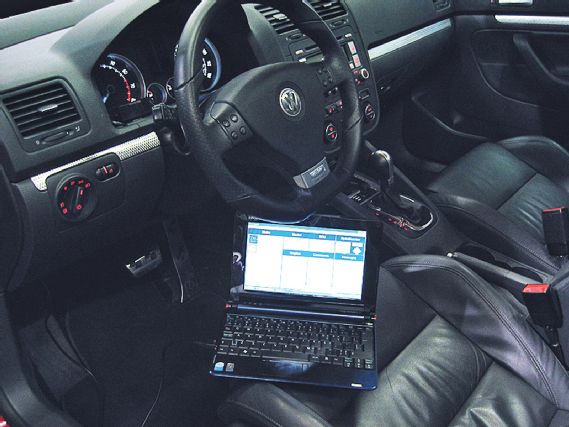 |
2007 Volkswagen GTI - Proven
|
2007 Volkswagen GTI - Proven
Having owned numerous DSG-equipped vehicles, I had to wonder if the HPA DSG software upgrade would have any ill effects. After much research, it is my conclusion that it's not the DSG software or extra power that reduces longevity. It's improper maintenance of the DSG transmission.
VW and Audi recommend servicing the DSG/S-tronic transmission every 40,000 miles. Manufacturer-recommended service intervals reflect the maximum mileage that you would want to accrue before potentially detrimental effects occur. Also, their mileage quotes may be biased and serve to fit the free-service intervals rather than ensuring the extended life of the vehicle. So what should the service interval be? As always, there's no clear-cut answer that fits every vehicle. The life expectancy of the DSG's synthetic fluid is dependent on the varying range of temperatures, pressures, topographical variances, and driving styles that it is exposed to.
For example, take two DSG-equipped cars driven in a mild Southern California climate. One vehicle is unmodified and driven conservatively, so the recommended service interval of 40,000 miles should not be an issue. The other vehicle is heavily modded and driven aggressively on and off the track. In this case, the DSG service interval should be more frequent, about every 20,000 miles. Think of changing the tranny fluid like you would your engine oil: doing it often and with the proper tools can save you a major headache.
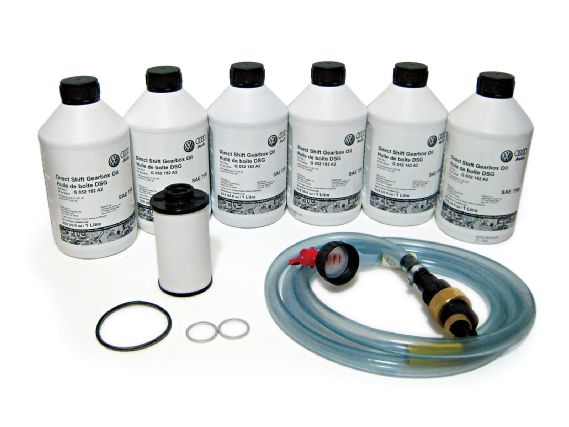 |
2007 Volkswagen GTI - Proven
|
2007 Volkswagen GTI - Proven
If you plan on keeping the vehicle for any length of time, it could be worthwhile to invest in the tools needed to perform service yourself. Most of the initial expense is invested in tools, but the rest comes from the oil filling adapter and software. It is possible to "MacGyver" a fill tool, but the money you save by doing the job yourself will eventually pay for the OEM tool. As for the software, it is used to make sure the fluid level is correct when the transmission fluid is up to temperature. This step is required, because if the fluid levels are incorrect it could be disastrous.
Parts Cost
HPA DSG/S-Tronic Stage 2 $899
MSRP total.$899
• ECS DSG Transmission Filter Kit: OEM DSG Fluid OEM DSG filter, OEM DSG O-Ring, OEM DSG fluid (6 liters)
OEM Sealing washers Price: $151.82
• ECS OEM DSG Oil Filling Adapter Kit Price: $209.95
• VCDS (VAG-COM Diagnostic System) License with Micro-CAN Interface for PC Price: $249*
• HPA Motorsports VAD (Versatile Automotive Diagnostic) for Mobile Devices Prices start at: $269*
(*Only one diagnostic tool required )
Additional tools required:
24mm socket 8,14mm hex key socket, ratchet, extention,six- liter fluid collection tray, torque wrench

